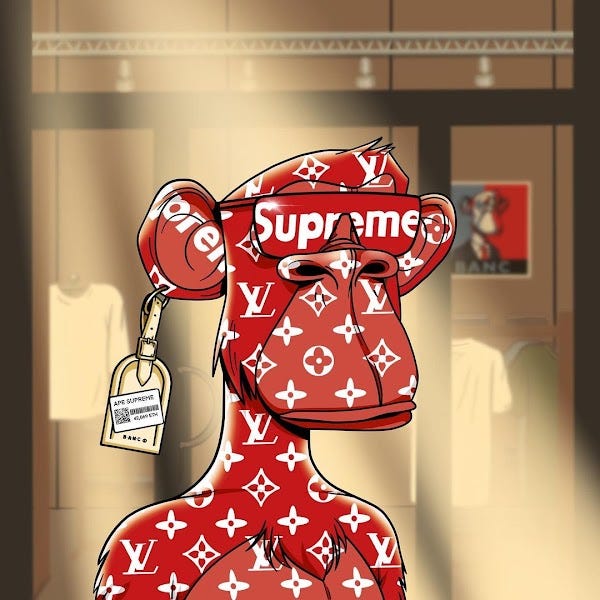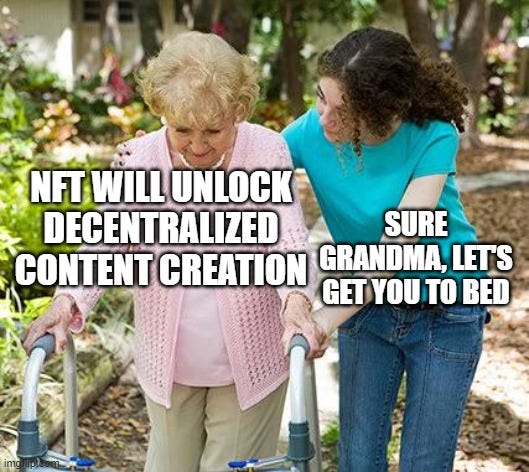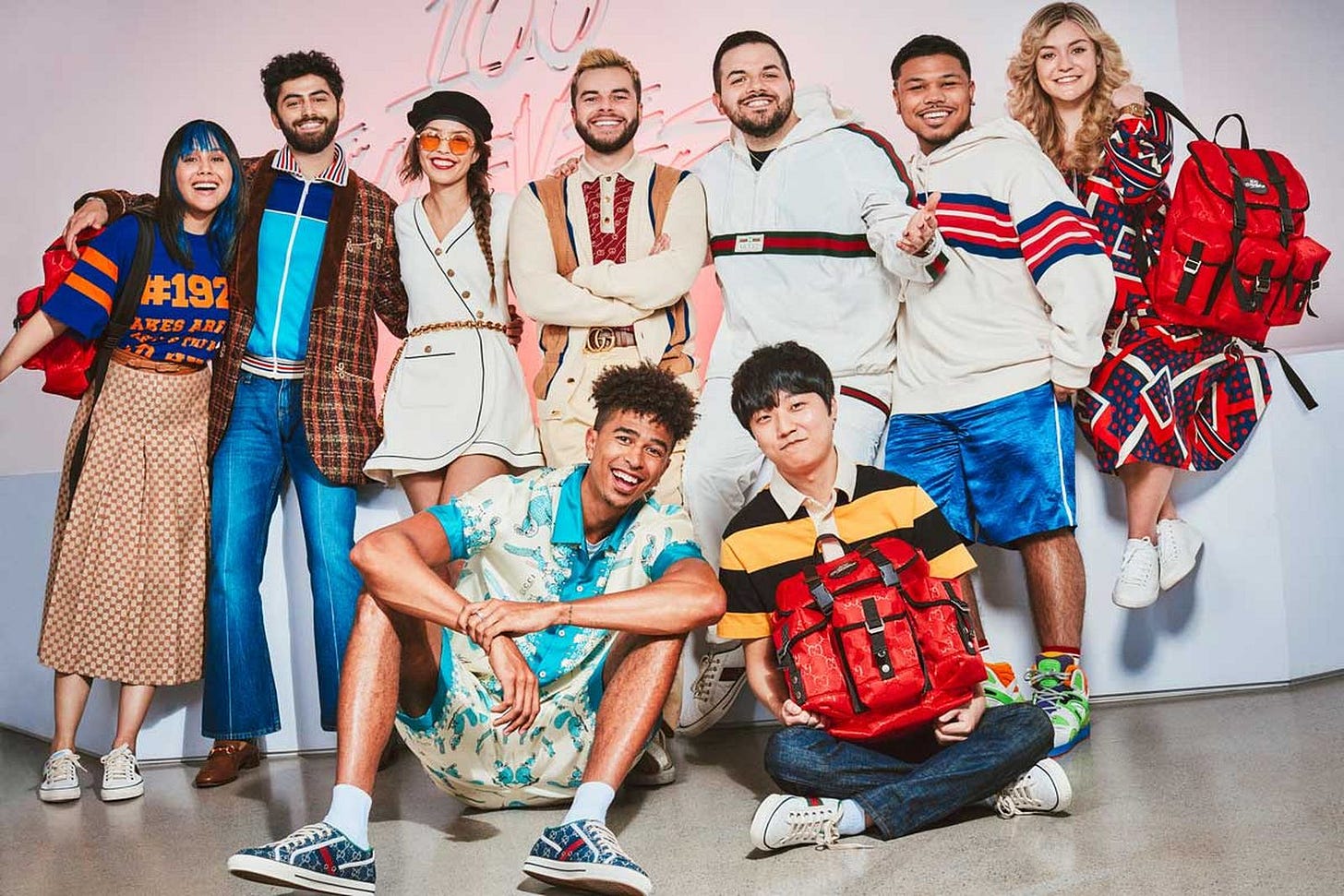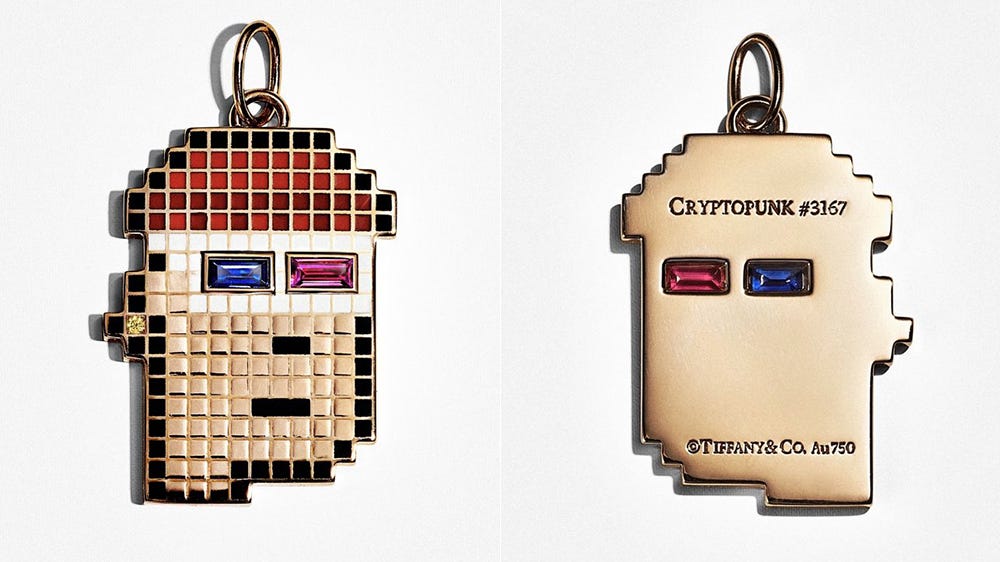NFTs, Culture, and Luxury Brands
Tapping into the innate human behavior that seeks exclusivity and status.
Disclaimer, NFA, all that legal stuff: All the information presented on this publication and its affiliates is strictly for educational purposes only. It should not be construed or taken as financial, legal, investment, or any other form of advice.
Hi folks,
I’ve been blown away by the responses to my first long-form article that was published last week. Thank you to the 1,500 of you that took the time to read it. That number might seem small for some of you, but it is substantial for me. I hope this publication continues to provide value for its readers while also serving as a platform to arrange my thoughts.
NFTs, Culture, and Luxury Brands
In the year 2021, multiple studies found that Youtuber is the most popular job that children aspire to be when they grow up. Long gone are the days when children would mention quintessential professions such as Doctors and Astronauts, the younger generations have figured out that creating obnoxious vlog content on the internet will garner a lot more fame and money — thanks, Paul brothers!
Jokes aside, we can’t deny the massive cultural change that started approximately a decade ago when Youtube and social media took over the internet, and the world — ushering in an entirely new class of “celebrities” that look and feel a lot more like your next-door neighbor. The outcome of this new class of celebrities, often called influencers, is a significant change in how we perceive brands, status, and culture.
Anyway, how does this all tie together with NFT?
The NFT market experienced its first bull cycle in 2021, onboarding many retail market participants including those who are not financially savvy. At the same time, celebrities and influencers flocked to NFT because of its seemingly “easy-to-understand” value proposition and easy money. As a result, we saw that for the first time, crypto successfully penetrated mainstream culture through NFTs — with artists, musicians, and influencers being involved with some sort of NFT projects.
Perhaps unsurprisingly, what comes after the hype dies down and prices stop going UpOnly is the increasingly negative sentiment and skepticism towards NFTs. Many argue that in retrospect, JPEGs selling for $100,000 was a sign of a bubble and that there was not a single practical use case. This negative sentiment has gotten so bad that there is even a growing base of influencers who take the angle of being anti-NFT to get more views and exposure.
In this write-up, we present our thinking as to why not all NFTs are useless, and that the most strategic and practical use-case for NFTs is in the luxury space, tapping into the innate human behavior that wants exclusivity and status. We believe that this is true at least in the short term until the regulatory landscape matures.
Here are the quick takeaways:
NFTs’ most pragmatic use case is tapping into the innate human behavior that seeks exclusivity and status.
NFT brands need to be honest and admit that their primary value add is tied to their brand, just like luxury goods.
Most NFT brands focus too much on the digital experience, which will be the biggest strategic mistake.
Creating experiences that combine physical and digital space via NFTs will be the true value unlock.
NFT use-cases in other sectors won’t grow until the regulatory landscape matures.
Fame > Wealth in 2022
There was an old saying: “true happiness in life is to be rich and anonymous”.
While I believe that the statement remains true, the rise of influencer culture in the past decade has changed the dynamic between fame and wealth. Gone are the days when famous figures need to rely heavily on agencies and managers. Famous figures can now directly control their distribution channel with the help of social media platforms.
As a result, people with fame have ventured into the business world much more significantly in the past decade. They own their distribution channel and interact directly with their fans, which are also the end consumers of whatever they’re trying to sell. In other words, even your classic celebrities have also become internet influencers.
Some examples:

In short, famous figures with followings have discovered that using their influence to market and sell products is the true reward of fame. This is why GenZ aspires to be internet famous more than any of the prior generations since they know that it is becoming increasingly easier to convert fame into wealth.
We get your point. Can we go back to talking about NFTs?
The Rise of NFTs
If 2020 was the year when NFT started gaining traction, 2021 was the year when NFT truly experienced its bull cycle. What started as an experiment to generate on-chain verifiable, unique pixelated profile pictures and breeding digital cats quickly became a multi-billion dollar market where market participants threw in their mortgage down payment to become a part of an exclusive group of monkey picture owners.
Tens of billions of dollars were traded and famous figures, as well as brands, came into the scene to capitalize on the new opportunity and to signal to their audience that they were young, hip, and tech-savvy. I’m a bit more bearish on this aspect since it requires DAO-like governance which has multiple issues to be solved, but that topic deserves a full write-up on its own.
Despite the emergence of different types of NFTs ranging from profile pictures to generative algorithm arts and even 1-of-1 collections, we have seen times and times again that all of these are just risk assets at the end of the day. In fact, a few months back when the NFT narrative seemed to be moving away from profile picture collections, it quickly reverted back with the success of Azuki and Moonbirds. I’m not even touching on P2E NFTs here because those are useless if there are no expected benefits that one will get by owning them, but I digress.
This shows that exclusivity and a sense of belonging associated with a brand or a culture is the purest value proposition of NFTs.
This value proposition is most similar to luxury brands.
Luxury Brands & Culture in 2022
The luxury space is a $1.3 trillion industry. Out of the top 10 wealthiest people in the world, luxury is the only industry other than tech, finance, or manufacturing that has put an individual on the list. In fact, Bernard Arnault of LVMH has placed the #1 spot a few times, surpassing Gates, Musk, and Bezos. This shows that the luxury industry was not “disrupted” by technology but instead enhanced as people can now signal their status across the digital space, not just physical.
The two most important factors that will make a luxury brand successful are:
understanding culture
maintaining the customer bond and experience
Kering Group understands where the culture lies for the younger generation and decides to go heavy by tapping into the eSports and hip hop culture with Balenciaga being the most mentioned brand in hip hop songs lyrics and Gucci collaborating with 100 Thieves. In February 2022, Kering also created a team fully dedicated to Web 3.0 as well as individual teams for Gucci and Balenciaga. CEO François-Henri Pinault stated that he sees three potential metaverse opportunities for luxury:
NFTs linked to physical products
NFTs linked to virtual products
Smart contracts that give revenue from secondary sales
LVMH understands how to maintain customer experience and the bond that has been built over decades, which is why it decided to partner with Prada and Cartier (of Richemont Group) to develop their own Aura Blockchain Consortium with a focus on global luxury. Luxury brands love to have total control over the narrative and messaging that they convey to their customers, which is why they came up with their own blockchain. Decentralization purists would argue that this is somewhat antithetical to the notion of the bottoms-up decentralized nature of most NFT projects. At the end of the day, consumers will decide and we shall see whether bottoms-up brands such as Moonbirds, BAYP, and Doodles can compete with legacy luxury brands.
Combining Physical & Digital
Dolce & Gabbana revealed its 9-piece unique Collezione Genesi NFTs in August 2021 and generated approximately $5.7M in sales. Buyers received both the NFT and physical versions of the item and gain exclusive perks which include access to future Dolce & Gabbana events. This is a great example of combining physical and digital experiences.
Let’s get even more creative.
Imagine a Bulgari NFT collection that gives you the following perks:
Access to future events and runway shows.
Early peek and access to future collections.
Complimentary 2 nights stay in the Bulgari Resort Bali every year.
Digital rights to use Bulgari items in the metaverse.
Access to future investment or commercial opportunities.
If Bulgari launches 10,000 of such NFTs, I wouldn’t be surprised if the market capitalization of that collection hits $500M.
At this point, crypto skeptics will probably ask:
“Why not just have a normal premium membership card instead of an NFT?”
Great question.
Here are some reasons that might not seem so obvious at a glance:
Access to an automatically established secondary market
The NFT itself becomes an “asset” and is fully owned by the owner, unlike a traditional membership card.
The endgame is for the legal rights to be embedded on the blockchain also.
Interoperability with the DeFi market, including lending-borrowing.
Seamless access to a global audience.
Future integration with metaverse projects.
okay, so what do NFT projects have to do?
NFT Value Proposition: Being a Part of an Exclusive Club
NFT collections, whether it be profile pictures or generative arts, need to strategize their roadmap and think “like” a luxury brand — however, it doesn’t have to position itself at a super expensive price point or become the penultimate form of luxury. Any sense of belonging or exclusivity will work. Patagonia isn’t a “luxury” item but it has a unique identity built around it. Supreme isn’t a traditional “luxury” brand but its box logo t-shirt will sell for $1,000 in the secondary market thanks to streetwear culture.
Of course, it’s a given that the product can’t be bad — but in summary, just like how luxury brands have been able to integrate themselves with culture, both classic and contemporary, NFTs need to start shaping their brands alongside these basic human instincts while balancing the financialization aspect to ensure that the “experience/bond” created feel genuine. Focusing on experiences that are too digital will be the primary strategic mistake of most NFTs. Creating hybrid experiences that combine physical and digital space, as well as a relentless focus on delivering products that the customers want will be the key to winning.
Last but not least, it’s important to note that NFT’s potential is significantly much more than just the luxury industry, but it will take a while before we get there. Concepts such as NFT for records (healthcare, housing), or owning the rights/royalties to IP (music NFT) will face multiple geographical regulatory hurdles that it’s not worth wasting our brain power discussing these concepts in great detail yet.
Land of the Rising Sun
Lots of tragic things came out of Japan in the past week. Former Prime Minister Shinzo Abe was assassinated and the creator of the Yu-Gi-Oh anime/trading card game, Kazuki Takahashi, passed away from drowning. I grew up playing Yu-Gi-Oh competitively, even becoming the champion of my elementary school tournament; maybe the nostalgia is why I mentioned it in the same sentence with Shinzo Abe. Seeing such a horrible act committed in a country where gun deaths are extremely rare is very concerning. It seems that the world is becoming more volatile than ever. Witnessing these untimely deaths have always grounded me on what’s important. The feeling is similar to when Kobe passed away in 2020. It made me realize what is truly important in life. Working hard is a must, but always remember to spend time with the people you care for and take care of your health.
Until next time,
Marco M.













I think it'd be great if you continue this "wider view" ending like you did in the last paragraph. Could make your writing very valuable and useful, especially to all us folks who are online a lot, reading a lot, and moving through internet tabs. A nice reminder of what's important. Thank you <3